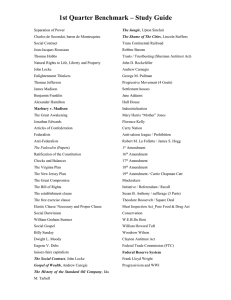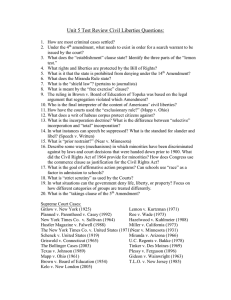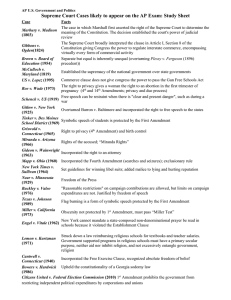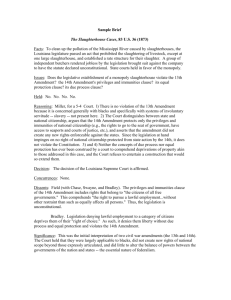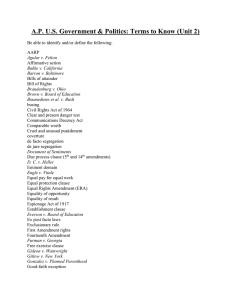Incorporation: Applying the Bill of Rights to the States
advertisement
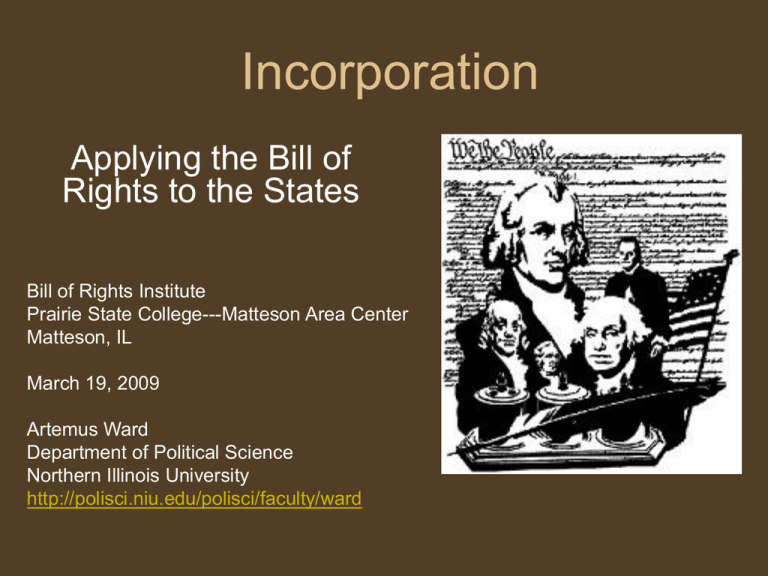
Incorporation Applying the Bill of Rights to the States Bill of Rights Institute Prairie State College---Matteson Area Center Matteson, IL March 19, 2009 Artemus Ward Department of Political Science Northern Illinois University http://polisci.niu.edu/polisci/faculty/ward What is the Bill of Rights? • The first 10 Amendments to the U.S. Constitution. • Passed by the first Congress in 1791. • The Bill of Rights was added to the Constitution because of the fear that the federal government might become too powerful and encroach on individual rights. What is Incorporation? • Consider the 1st Amendment: "Congress shall make no law . . . abridging the freedom of speech.” What does this mean? • Can state legislatures pass laws curtailing their citizens' free speech? • Incorporation: The process by which certain provisions of the Bill of Rights have been made applicable to the states. • Selective Incorporation: As America entered the 20th century, the Supreme Court slowly began to inform state governments that they too must abide by most guarantees contained in the first 8 amendments to the federal Constitution. Constitutional Convention • Before the Framers adjourned the convention, "It was moved and seconded to appoint a Committee to prepare a Bill of Rights." The motion, however, was defeated. James Madison • James Madison submitted to the First Congress a list of 17 amendments, mostly aimed at safeguarding personal freedoms against tyranny by the federal government. • June 7, 1789: In a speech to the House, he suggested that "in revising the Constitution, we may throw into that section, which interdicts the abuse of certain powers of the State legislatures, some other provision of equal, if not greater importance than those already made." James Madison • Madison's proposed 14th amendment said that "no State shall violate the equal right of conscience, freedom of the press, or trial by jury in criminal cases." This article failed to garner congressional approval, so the states never considered it. • Although scholars now agree that Madison viewed this amendment as the most significant among the 17 he proposed, Congress's refusal to adopt it may have meant that the Founders never intended for the Bill of Rights to be applied to the states or local governments. Barron v. Baltimore (1833) • The first case in which the U.S. Supreme Court considered nationalizing the Bill of Rights. • A wharf owner sued the city of Baltimore for economic loss occasioned by the city’s diversion of streams, which lowered the water level around his wharves. He claimed that the city took his property without just compensation in violation of the 5th Amendment, which states: “. . . nor shall private property be taken without just compensation.” • Does the 5th Amendment apply to state governments? Chief Justice John Marshall • “Had the framers of the [Bill of Rights] intended them to be limitations on the powers of state governments, they would have imitated the framers of the original constitution, and have expressed that intention.” • “It is universally understood, it is part of the history of the day, that the great revolution which established the constitution of the United States, was not effected without immense opposition. . . . In compliance with a sentiment thus generally expressed, to quiet fears thus extensively entertained, amendments were proposed by the required majority in congress, and adopted by the states. These amendments contain no expression indicating an intention to apply them to the state governments. This court cannot so apply them.” 1833-1866 • What resulted from Barron? • From the 1830s until the Civil War southern states made speech and publication critical of slavery a crime. • A number of leading Republicans viewed these statutes as violations of the 1st Amendment and other provisions of the Constitution. • Immediately after the Civil War, Republicans complained that southern states were denying African-Americans, Republicans, and loyalist citizens basic rights to free speech and press, to due process, and to bear arms. The th 14 Privileges or Immunities Clause → Due Process Clause → Equal Protection Clause → Amendment (1868) • “No state shall: • make or enforce any law which shall abridge the privileges or immunities of citizens of the United States; • nor shall any state deprive any person of life, liberty, or property, without due process of law; • nor deny to any person within its jurisdiction the equal protection of the laws.” The Slaughterhouse Cases (1873) • Does the Privileges or Immunities Clause of the 14th Amendment “incorporate” or make applicable the Bill of Rights to the states? • “We are convinced that no such results were intended by the Congress which proposed these amendments, nor by the legislatures of the States which ratified them.” • Miller’s opinion had the effect rendering the Privileges or Immunities Clause virtually useless, a condition that has changed little since then. Today, the Clause remains a virtual nonstarter in the law. Justice Samuel Freeman Miller Hurtado v. California (1884) Justice Stanley Matthews • Does the Due Process Clause of the 14th Amendment “incorporate” the Bill of Rights? • The case involved a state prosecution of murder without a grand jury indictment. • The 5th Amendment states: “No person shall be held to answer for a capital, or otherwise infamous crime, unless on a presentment or indictment of a Grand Jury . . . nor be deprived of life, liberty, or property, without due process of law.” • Does the 5th Amendment’s protection of a grand jury apply to state governments? • The Court explained that unlike the 14th Amendment, the 5th Amendment states that persons are guaranteed both due process and grand jury protections. Since the 14th only lists due process, grand jury indictment is not part of that phrase. • Therefore, the 14th Amendment’s Due Process Clause does NOT incorporate the 5th Amendment’s grand jury provision. Chicago, Burlington & Quincy Railroad v. Chicago (1897) • The case involved the Takings Clause of the 5th Amendment – just as in Barron. Chicago took railroad property but paid the companies only $1. • Attorneys now agued that the 14th Amendment’s Due Process Clause incorporated the 5th Amendment’s Takings Clause. • The Court held that the Takings Clause constituted “a vital principle of republican institutions” without which “almost all other rights would become worthless.” • The railroad companies won. But more importantly, for the first time the Court incorporated a clause contained in the Bill of Rights. • Yet, in the next incorporation case, Maxwell v. Dow (1900), a state criminal defendant was denied a grand jury indictment and was tried by an 8-person jury rather than the traditional 12person jury. The Court refused to incorporate protections listed in the 5th and 6th Amendments holding “Trial by jury has never been affirmed to be a necessary requisite of due process of law.” Twining v. New Jersey (1908) A Standard Emerges • The Court held: “It is possible that some of the personal rights safeguarded by the first eight Amendments against National action may also be safeguarded against state action, because a denial of them would be a denial of due process of law. If this is so, it is not because those rights are enumerated in the first eight Amendments, but because they are of such a nature that they are included in the conception of due process of law. . . . This court has always declined to give a comprehensive definition of it, and has preferred that its full meaning should be gradually ascertained by the process of inclusion and exclusion in the course of the decisions of cases as they arise.” Justice William H. Moody Gitlow v. New York (1925) Justice Edward T. Sanford • “For present purposes we may and do assume that freedom of speech and of the press . . . are among the fundamental personal rights and ‘liberties’ protected by the due process clause of the Fourteenth Amendment from impairment by the states . . . . Reasonably limited . . . This freedom is an inestimable privilege in a free government.” Palko v. Connecticut (1937) • The Due Process Clause of the 14th Amendment incorporates those rights which are “implicit in the concept of ordered liberty” and which constitute “the very essence of a scheme or ordered liberty.” • “If the Fourteenth Amendment has absorbed them, the process of absorption has had its source in the belief that neither liberty nor justice would exist if they were sacrificed.” Justice Benjamin Cardozo Applying the Palko Standard • In the aftermath of Palko, the Court continued to selectively incorporate provisions of the Bill of Rights. Why? This was a compromise position among various members of the Court. • Liberal Justices Hugo Black and William O. Douglas argued that the 14th Amendment intended to make all of the provisions of the Bill of Rights applicable to the states • Moderate conservative Justices John Marshall Harlan and Potter Stewart said that the due process guaranteed by the 14th Amendment was meant neither to incorporate, nor to be limited to, the specific guarantees of the Bill of Rights. Attacks from the New Right Regime • In the 1980s, Attorney General Edwin Meese and others criticized incorporation as inconsistent with the intent of the Framers of the Constitution. • Justice Clarence Thomas has explained, “The text and history of the Establishment Clause strongly suggest that it is a federalism provision intended to prevent Congress from interfering with state establishments. Thus . . . it makes little sense to incorporate the Establishment Clause. • Under this formulation, can the state of Illinois establish a church? Today . . . • Today, essentially all of the important provisions of the Bill of Rights have been incorporated. • 1st Amendment: Fully incorporated. • 2nd Amendment: Supreme Court rejected incorporation in 1876 and avoided the issue in D.C. v. Heller (2008). • 3rd Amendment: No Supreme Court decision; 2nd Circuit found to be incorporated. • 4th Amendment: Fully incorporated. • 5th Amendment: Incorporated except for clause guaranteeing criminal prosecution only on a grand jury indictment. • 6th Amendment: Fully incorporated. • 7th Amendment: Not incorporated. • 8th Amendment: Incorporated with respect to the protection against "cruel and unusual punishments," but no specific Supreme Court ruling on the incorporation of the "excessive fines" and "excessive bail" protections. Resurrecting the Privileges or Immunities Clause? • • • • • In D.C. v. Heller (2008) the Court held that the 2nd Amendment protects the right of individuals in Washington, DC to posses handguns in the home. Yet the Court did not rule on whether the right also applied to the states. But in his majority opinion, Justice Antonin Scalia hinted in a footnote that a more thorough examination of the 14th Amendment may be in order. Currently, there is a case—McDonald v. Chicago—pending in the 7th U.S. Circuit Court of Appeals which involves Chicago’s ban on handguns. No matter how the 7th Circuit rules, the case will be appealed to the U.S. Supreme Court. Why might the Court take the case? Because both liberals and conservatives have joined forces in arguing that the basis for incorporating the 2nd Amendment is the Privileges or Immunities Clause of the 14th Amendment. Furthermore, as Scalia’s footnote in Heller suggests, some of the justices seem open to revisiting the incorporation controversy. For example, in Saenz v. Roe (1999) where the Court struck down a California law that gave lesser welfare benefits to new residents, Justice John Paul Stevens relied on the Clause as protecting the right to travel and reside in any state one chooses. In dissent, Chief Justice Rehnquist criticized what he saw as the Court “breathing new life” into the Clause. Justice Clarence Thomas agreed but said that he was open to reexamining it: “Although the majority appears to breathe new life into the Clause today, it fails to address its historical underpinnings or its place in our constitutional jurisprudence. Because I believe that the demise of the Privileges or Immunities Clause has contributed in no small part to the current disarray of our Fourteenth Amendment jurisprudence, I would be open to reevaluating its meaning in an appropriate case. Before invoking the Clause, however, we should endeavor to understand what the Framers of the Fourteenth Amendment thought that it meant. We should also consider whether the Clause should displace, rather than augment, portions of our equal protection and substantive due process jurisprudence. The majority's failure to consider these important questions raises the specter that the Privileges or Immunities Clause will become yet another convenient tool for inventing new rights.” Conclusion • The theory of selective incorporation, in concept, emerged the victor; but, for all practical purposes and with only a few exceptions, total nationalization, via the Due Process Clause, has prevailed. • As a result, present reading of the Constitution now ensures that the basic civil liberties of citizens of the United States are largely protected against infringement by any government entity—federal, state, or local. • Yet the recent moves toward resurrecting the Privileges and Immunities Clause could have unforeseen implications. Some liberals argue that invoking the Clause would have a "lift-all-boats" effect, strengthening free speech, and possibly even abortion and gay rights, at the same time that it bolsters the right to bear arms. On the other hand, conservatives see the Clause as potentially strengthening some rights—such as the right to bear arms—while weakening others that they have never believed are in the Constitution such as a right to privacy, abortion, and gay rights.
